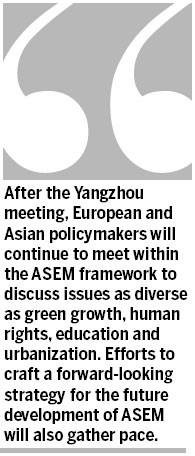Cooperation with vision needed
Updated: 2013-04-23 08:12
By Shada Islam (China Daily)
|
|||||||||||

ASEM should focus on establishing substantive support systems for its initiatives on peace and development
The Asia-Europe Meeting in Yangzhou, Jiangsu province on Thursday and Friday is likely to kick-start a review of relations between the two sides, which many argue is necessary to give fresh impetus to the process.
There is no shortage of ideas on how to increase the relevance of the meetings in a rapidly changing world, and the brainstorming in Yangzhou will look at the role of an ASEM in ensuring both regional and world peace and security.
ASEM has increased contacts between Asia and Europe in a variety of sectors, and there is increased understanding that tackling 21st century challenges like climate change, cyber security and terrorism requires closer relations between the two continents, while a robust global economic recovery is also conditional on stronger Asia-Europe cooperation.
"ASEM is of great strategic importance for the peace and development of the two regions," says Zhang Xiaokang, China's top official in charge of the Asia-Europe Meetings. "The meeting will be about exchanging views on ASEM: What should we do next, where are we heading?"
Zhang says that to achieve the "grand goal" of Asia-Europe cooperation, ASEM must deal with several key challenges and produce tangible results.
In order to boost their trade and investment ties with Europe, for instance, Asian countries need more detailed information on how to access European markets. "Many Asian people still find it difficult to understand and follow the complex European Union procedures," Zhang says.
Exchanges dealing with such practical concerns would be more useful than "dialogue for the sake of dialogue", she says.
Zhang notes that 17 years after its launch, ASEM still plays an important role in enhancing understanding between Asian and European countries, but she says the key question is how it will proceed in the years to come.
The Yangzhou meeting will look at the achievements and weaknesses of ASEM and the partnership's future development and direction. Best practices and experience will be shared with other key regional and multilateral organizations, including the Association of Southeast Asian Nations, the Asia-Pacific Economic Cooperation forum and the China-Japan-South Korea trilateral cooperation initiative.
Recommendations from the symposium will be sent to ASEM senior officials in the summer and then communicated to foreign ministers when they meet in Delhi in November this year.
Economic discussions within ASEM must be developed further and business leaders from both sides should meet more often, Zhang says. The former Chinese premier, Wen Jiabao, encouraged enterprises to establish joint research and development centers, technology transfer centers, joint incubators and other platforms for long-term and stable cooperation at the ASEM summit in Laos last year.
Participants at the Yangzhou meeting will also be encouraged to reflect on issues such as a possible ASEM free trade agreement, ways of improving ASEM consensus-building on political issues and enhancing public knowledge and awareness of Asia-Europe relations through stronger ASEM visibility programs and more intensive people-to-people links.
ASEM countries have long discussed the pros and cons of setting up a secretariat to allow more effective follow-up of decisions. Many argue that since ASEM is not an international organization, it cannot be judged on so-called deliverables and concrete output. Its real value lies in its ability to bring together European and Asian representatives to brainstorm on key challenges of the day.
But while the informality and flexibility of ASEM are important, Zhang says she is convinced there must also be an "effective support mechanism to ensure systematic cooperation" among all participants. "It does not have to be a secretariat. But for the moment, we have too many topics with little practical follow-up action. When there are initiatives, we need substantive support."
The strategic coordination role of ASEM senior officials could also be enhanced to provide such support, she says.
After the Yangzhou meeting, European and Asian policymakers will continue to meet within the ASEM framework to discuss issues as diverse as green growth, human rights, education and urbanization. Efforts to craft a forward-looking strategy for the future development of ASEM will also gather pace.
"I would like to define ASEM as a platform where Asia and Europe work together for peace and development," says Zhang. "We need cooperation with vision."
The author is head of policy, Friends of Europe, a think tank that aims to stimulate thinking on key global and European political challenges.
Related readings:
ASEM summit kicks off in Vientiane
ASEM a precious opportunity for Asia, Europe
ASEM a successful forum for peace
ASEM summit to focus on economy
Today's Top News
Net forex purchases for fourth month
No new stimulus needed: Experts
Chinese president appoints 5 new ambassadors
No H7N9 transmission between humans: WHO
Health new priority for quake zone
China, ROK criticize visits to shrine
Sino-US shared interests emphasized
Entrepreneurs see potential in market
Hot Topics
Lunar probe , China growth forecasts, Emission rules get tougher, China seen through 'colored lens', International board,
Editor's Picks

|

|

|

|

|

|





